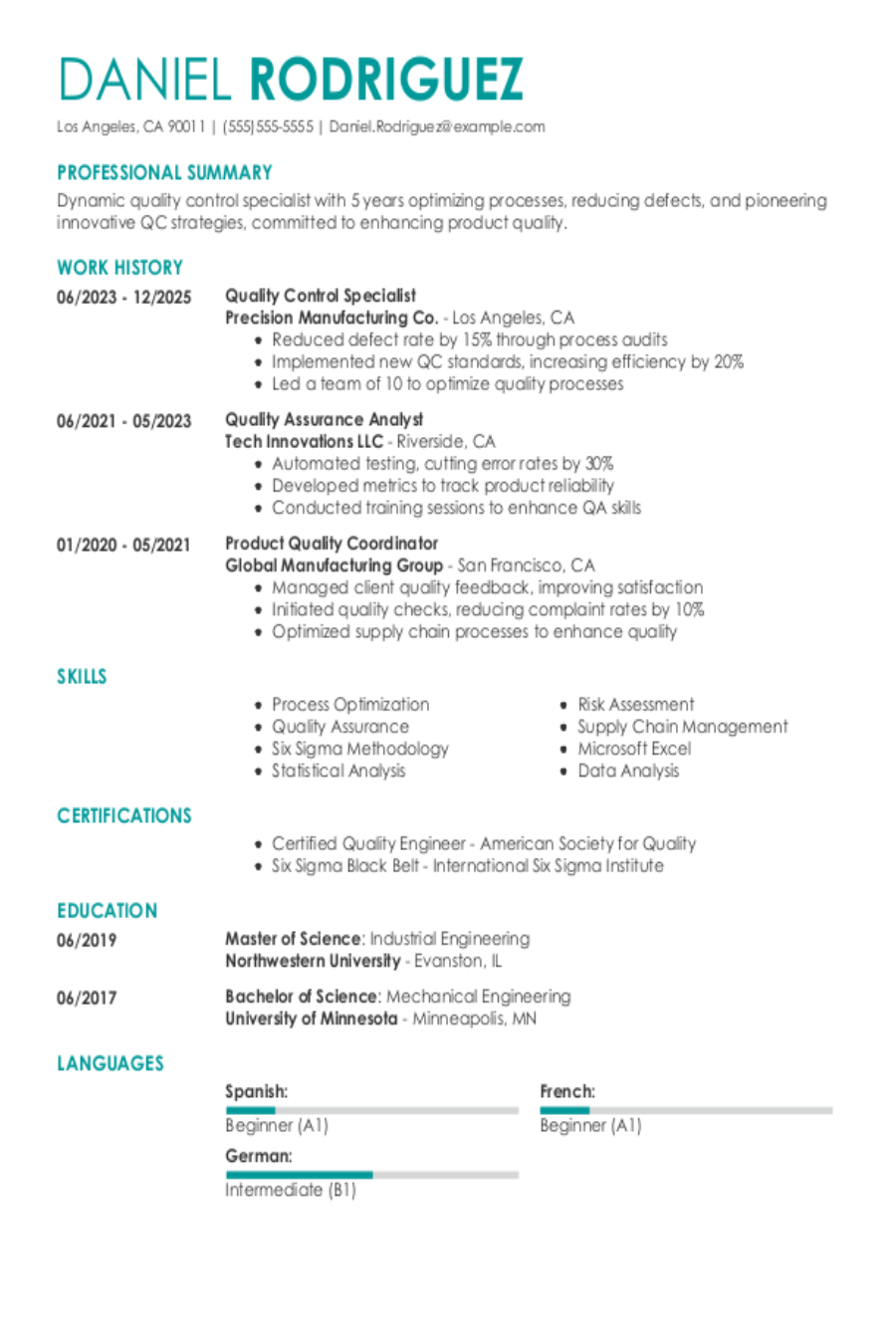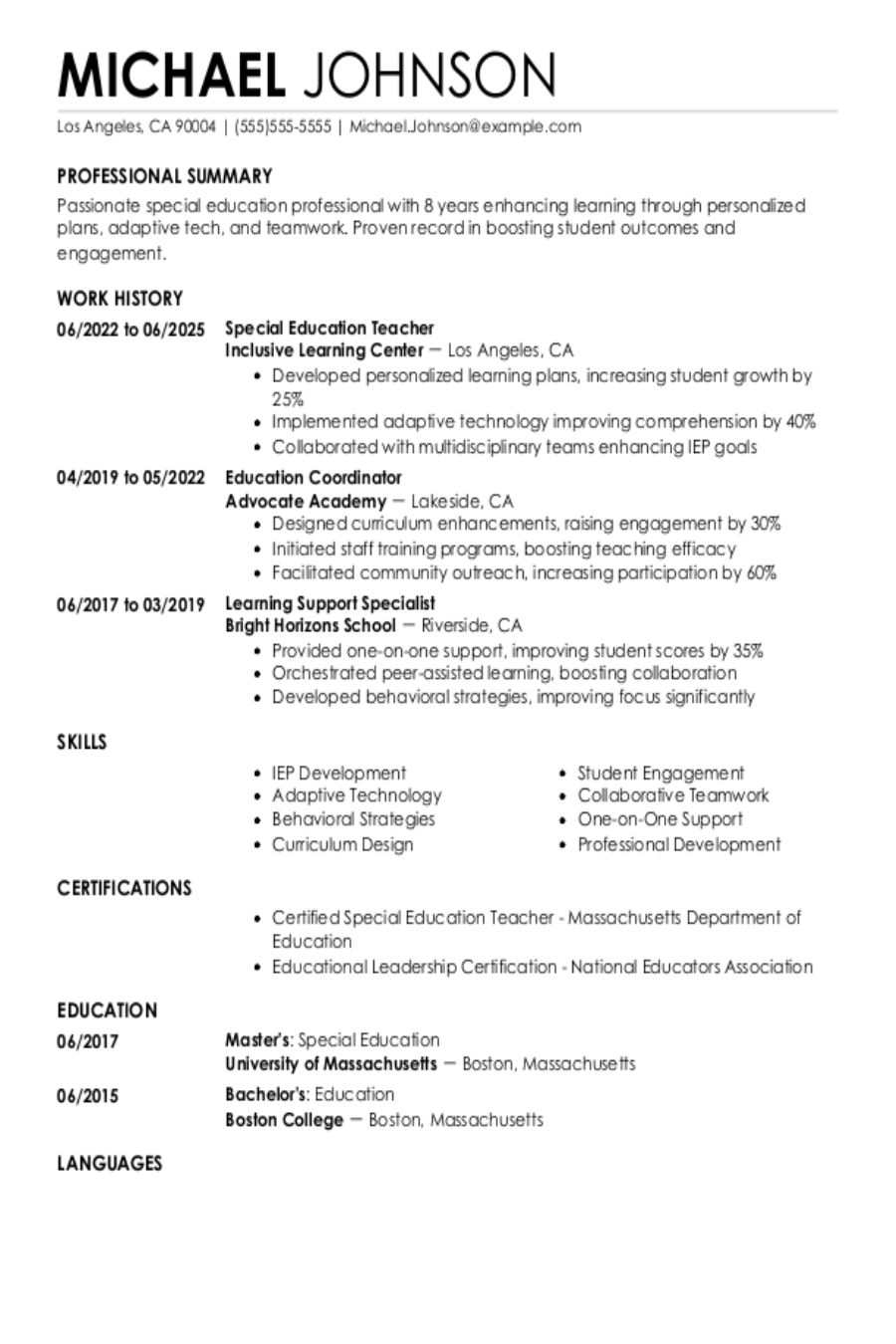Popular Law School Resume Examples
Current law student resume
A law school resume gains clarity and impact through a skills-based format, allowing job seekers to emphasize their legal research abilities and relevant coursework over traditional chronological experience.
Focuses on goals: The job seeker addresses their early career status by highlighting a strong academic background and notable accomplishments as a law clerk, demonstrating a commitment to professional growth in legal research and document drafting.
Emphasizes soft skills: This resume effectively showcases the job seeker's soft skills, particularly research, collaboration, and communication. Highlighting their ability to communicate helps this candidate appear ready for the complexities of a legal role.
Legal intern law school resume
A law student with internship experience should write a resume that combines current coursework, extracurriculars, and experience to present as an experienced candidate with relevant legal expertise.
Opens each bullet with active verbs: Using action verbs such as "drafted," "conducted," and "managed" highlight proactive contributions and the ability to drive significant improvements in legal processes.
Uses a neat template: Clean design and structured organization allow quick access to the applicant's qualifications. This clarity helps hiring managers and ATS efficiently evaluate skills and experiences relevant to early career legal roles.
Experienced law school resume
This law school applicant uses a neat and modern resume template to highlight academic achievements and relevant internships that showcase their legal expertise.
Highlight certifications: Listing certifications helps this experienced law student showcase their professional level of legal expertise.
Uses a modern template: This modern resume template showcases the job seeker's dedication to legal excellence and highlights their innovative approach through effective case management and research skills, making a strong impression in the competitive field of law.
More resume examples
Law School Resume Template
Looking to create a standout application? Use this law school resume template as your foundation—easily adapt it with your personal details and achievements.
PEPPER TOMLINSON
Los Angeles, CA 90001 | (555) 555-5555 | Pepper.Tomlinson@example.com
Resume Objective
Detail-oriented legal intern skilled in drafting legal documents and conducting thorough research to enhance case accuracy. Proven track record in improving client satisfaction and operational efficiency. Eager to leverage legal expertise and effective communication skills in a proactive legal environment.
Education
J.D., Criminal Law (Expected May 2029)
Columbia University – New York, NY
Bachelor of Arts, Political Science
University of California – Los Angeles, CA
Skills
- Legal Research
- Document Drafting
- Client Consultation
- Case Management
- Litigation Support
- Legal Software
- Communication Skills
- Time Management
Work History
Legal Intern – Law & Justice Firm, Los Angeles, CA
Jan 2025 – Jan 2026
- Drafted 20+ legal documents monthly
- Conducted research reducing 30% case errors
- Assisted with 15+ client consultations weekly
Legal Assistant – Smith & Partners, Long Beach, CA
Jan 2024 – Dec 2024
- Managed 10+ case files, organizing data
- Prepared briefs, enhancing efficiency by 25%
- Coordinated 5+ team meetings monthly
Accomplishments
- Increased client satisfaction by 40% in 2025
- Reduced document processing time by 50%
Certifications
- Legal Drafting Certification – National Legal Institute
- Corporate Law Certification – American Law Association
Writing Your Law School Resume
Having explored these compelling resume examples, you are now prepared to dive into how to write a resume. We'll guide you through each section step by step, ensuring you understand what to include and how to present yourself effectively.
List your most relevant skills
An effective skills section on your law school resume must highlight both legal knowledge and essential soft skills such as analytical thinking and teamwork.
Incorporating keywords from the job listing into your skills section is important. This approach not only helps human recruiters see that you are a good fit but also optimizes your resume for applicant tracking systems. By aligning your skills with the requirements listed, you increase your chances of passing initial screenings and standing out among other applicants.
Example of skills on a law school resume
- Proficient in using case management software to streamline client interactions
- Adept at conducting comprehensive legal analyses and formulating strategies
- Strong communicator with a knack for negotiation and mediation
- Organized with exceptional time management skills to meet deadlines
A strong skills section should highlight both hard and soft skills, demonstrating an applicant's ability to handle technical tasks while also effectively engaging with colleagues and clients.
Highlight your work history
A standout work experience section should highlight your achievements and how you've applied your legal skills in practical settings. By showcasing specific accomplishments, you can illustrate your value and readiness to tackle the challenges of a legal career.
When detailing each position, include key information: your job title, the name of the organization, and the dates you were employed. This clarity helps potential employers quickly verify your background and understand the context of your experiences.
Many law students lack concrete work experience, but your resume can still have a strong experience section. Without work history, use volunteer experience, extracurriculars, and academic achievements to fill out this section.
Example of a law school work experience entry
- Legal Intern
Smith & Associates Law Firm - New York, NY
June 2021 - August 2023 - Conducted comprehensive legal research and drafted memoranda on case law impacting litigation strategies, improving the team's preparation process.
- Assisted attorneys in preparing for trial by organizing evidence and developing case briefs that improved argument clarity.
- Participated in client meetings, effectively communicating complex legal concepts and fostering strong client relationships.
- Collaborated with a team of 5 clerks to streamline document management processes, reducing retrieval time by 30%.
- Supported pro bono initiatives by conducting community workshops on legal rights, positively impacting local awareness.
Quantifying achievements in law school is essential as it illustrates your dedication and effectiveness. For example, noting that you completed 10 legal research projects with a 90% accuracy rate demonstrates not only your research skills but also your commitment to excellence in legal studies.
Include your education
The education section of your law school resume should list your degrees and relevant credentials in reverse-chronological order, starting with the most recent. If you hold a higher degree such as a bachelor's or juris doctor, exclude your high school diploma.
If you are currently enrolled in law school or have not yet completed your degree, note the highest level of education achieved along with your expected graduation date. You might want to add bullet points highlighting significant coursework or academic accomplishments that relate directly to your goals in the legal field—this is especially useful for those who are still students or recent graduates.
Common certifications for a law school resume
- Juris Doctor (JD) – American Bar Association (ABA)
- Master of Laws (LLM) – Various accredited law schools
- Bar Examination – State Bar Associations
- Certified Legal Manager (CLM) – Association of Legal Administrators (ALA)
Showcase publications and research
For law school professionals, showcasing your publications not only highlights your academic prowess but also reinforces your commitment to the legal field. Publications serve as tangible evidence of your ability to conduct thorough research and engage with complex legal issues, thereby establishing you as a credible applicant in a competitive job market.
Create a dedicated publications section if you have several articles, papers, or contributions that illustrate your expertise. Conversely, for one or two significant pieces, integrating them into sections like education or relevant experiences might be more fitting. To ensure clarity and professionalism within legal academia, use proper citation formats when listing these works.
Example of a publications section
- Anderson, K. & Lee, M. (2024). "Legal Perspectives on Cybersecurity". Journal of Internet Law, 19(3), 45-60.
- Williams, R., Patel, S., & Chen, L. (2023). "Comparative Analysis of International Trade Laws". Global Trade Review, 11(2), 75-89.
- Research Assistant, Legal Reform Initiative (2022–2023). "Law School Research Contribution". Assisted in drafting policy briefs for legislative reforms.
- Nguyen, T., Smith, D., et al. (2022). "Co-authored Developments in Intellectual Property Rights". Intellectual Property Journal, 27(1), 112-137.
Sum up your resume with an introduction
Your resume profile serves as your first opportunity to make a strong impression on potential employers. It succinctly highlights your qualifications and sets the tone for the rest of your resume.
For experienced job seekers, a professional summary is often the best choice. This format allows you to showcase significant accomplishments and relevant skills that demonstrate your expertise in the field. By placing this summary at the top of your resume, hiring managers can quickly gauge how well your background aligns with their needs.
If you have limited experience, consider writing a goals-focused resume objective that emphasizes your dedication to career growth.
Professional summary example
Dynamic law school graduate with over 3 years of extensive internship experience in litigation and transactional law. Demonstrated ability to conduct thorough legal research, draft persuasive legal documents, and support case strategies effectively. Committed to delivering high-quality assistance to legal teams while maintaining a focus on client needs and procedural accuracy.
Resume objective example
Enthusiastic law school student eager to use strong analytical skills and attention to detail in a collaborative legal environment. Committed to applying effective research abilities and clear communication to support case development and improve client satisfaction.
A strong resume profile should always begin with your job title, whether you choose a professional summary or an objective statement. Starting this way allows you to clearly communicate your professional identity and ensures employers recognize who you are and what you contribute right away.
Add unique sections to set you apart
Improve your law school application by including optional sections that highlight your unique qualifications as a applicant. These sections allow you to present aspects of your experience that set you apart from others.
Consider adding details about relevant hobbies or volunteer work that align with your values and skills. For example, if you've volunteered at a legal aid clinic, it showcases your commitment to justice and community service. Sharing these experiences not only reflects your personal interests but also provides insight into how you approach challenges, making your application more compelling to admissions committees.
Three sections perfect for a law school resume
- Legal internships: Gaining practical experience through internships is important in the legal field. Highlight the firms or organizations where you interned, the specific tasks you undertook, and any notable contributions that showcase your practical skills.
- Publications: Publishing articles or papers indicates your engagement with legal scholarship. Include titles of your publications, where they were published, and a brief summary of their content and significance to demonstrate your analytical skills.
- Volunteer work: Involvement in pro bono work reflects your commitment to social justice. List organizations you've volunteered with, the nature of your work, and any impact it had on the community.
5 Resume Formatting Tips
- Choose a format that matches your career stage.
Selecting the appropriate resume format is key for effectively showcasing your qualifications. If you're an experienced professional, a chronological format can highlight your career progression. For those just starting out, a functional resume allows you to emphasize skills over experience. Consider a combination format if you want to present both aspects clearly.
- Pick a smart resume template.
Using a professional resume template is important for ensuring your information is clear and easy to digest. A well-structured template not only improves readability but also saves you time with formatting. If you prefer a custom design, focus on simplicity and select fonts that are friendly for applicant tracking systems.
- Use an appropriate font.
Selecting the right font is important for making your resume stand out. Opt for a clean and professional font such as Garamond, Helvetica, or Georgia to improve readability and ensure clarity for both ATS and hiring managers.
- Use consistent formatting.
Ensure your resume features a clean left alignment and even margins. This consistency creates a polished look that makes a strong impression on potential employers.
- Keep your resume to one or two pages.
When outlining your resume, remember that resumes should be one page long unless you have extensive experience. Keep your content concise, highlighting only the most relevant information to make a strong impression.
Tools for Your Job Search
Are you preparing to apply for law school and want your application to stand out? Before submitting your resume, consider using our ATS Resume Checker. This tool provides essential feedback on how your resume will perform with the automated systems that many schools use for the initial screening of applicants.
Looking for a way to improve your application even further? Our AI Resume Builder offers personalized recommendations tailored to your academic achievements and extracurricular activities, along with professionally designed templates that effectively showcase your qualifications to admissions committees.
Frequently Asked Questions
Last Updated: January 14, 2026
Absolutely. A cover letter is important as it adds depth to your resume and creates valuable communication opportunities with employers. It allows you to express your passion for law school and demonstrate how your unique experiences make you a strong job seeker. Make sure to write a cover letter that highlights your enthusiasm and qualifications.
For an easy solution, check out our AI Cover Letter Generator, which assists you in crafting tailored cover letters quickly. With a variety of cover letter template options available, you can ensure that your cover letter aligns perfectly with your resume, improving your overall application.
A resume is typically concise, spanning one to two pages, while a CV (curriculum vitae) can extend several pages and includes comprehensive details about your academic achievements, research contributions, and professional experiences. Resumes focus on summarizing skills and experiences relevant to a specific job application.
You will often need a CV for roles in academia or specialized fields like law. If you're unsure whether a CV or resume is appropriate for your situation, our online CV Maker can help you craft tailored documents quickly. Choose from various CV templates designed for different industries and career levels to present your qualifications effectively.
For a law school resume, one page is generally adequate to showcase your qualifications. However, if you have extensive experience or unique accomplishments, a two-page resume format may be appropriate to adequately present your background and skills.
To write a strong CV, focus on organizing your information under clear headings such as education, work experience, skills, and certifications. Select professional templates that are visually appealing and compatible with applicant tracking systems. Tailor your CV for each application by including relevant keywords from the job posting to improve your chances of getting noticed.
For additional guidance, explore CV examples from successful professionals in the legal field. Analyzing how they structure their information and present their achievements can provide valuable insights and help you craft a compelling document that stands out to employers.
When you have gaps on your resume, be upfront about them. Explain why they occurred and highlight any productive activities you engaged in during that time, such as volunteering, courses, or personal projects. This approach not only shows honesty but also demonstrates your commitment to growth. Once you've addressed the gap, refocus on your skills and experiences that make you a strong applicant for the position.
Was this information helpful? Let us know!
Hailey is a career advice writer dedicated to helping job seekers excel in their careers.
More resources

50+ Resume Statistics Job Seekers Need to Know in 2026
If you want to be a competitive applicant you need to be on t...

How to Put AI Skills on Your Resume in 2026 + Examples
Artificial intelligence (AI) skills have become a valuable ass...

Purchasing Resume: Examples & Templates
As a purchasing professional you need a resume that captures ...

Quality Control Resume: Examples & Templates
As a quality control professional you need a resume that high...

Special Education Resume: Examples & Templates
As a special education professional your resume must highligh...


